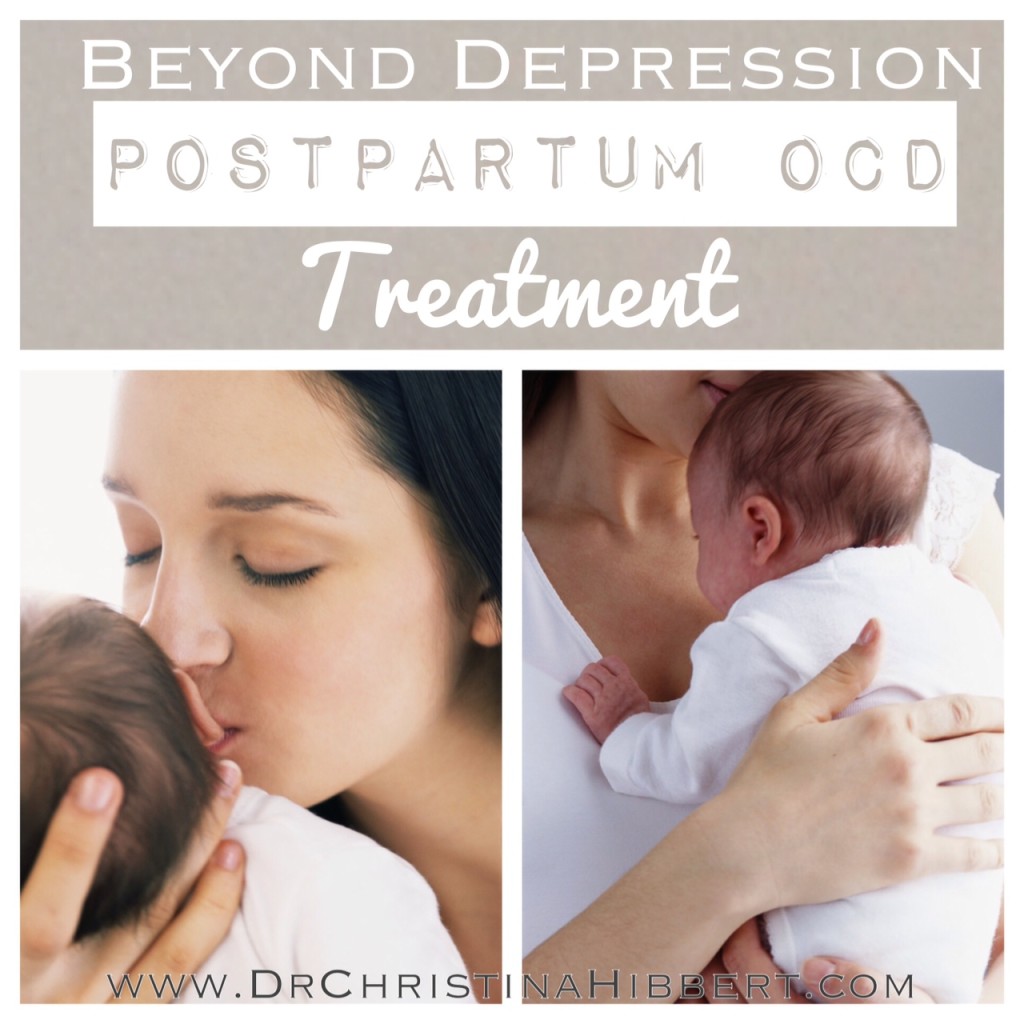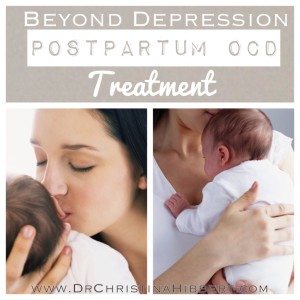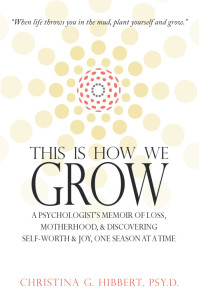
31 Mar Beyond Depression: Postpartum OCD Treatment–part 3 (& video)
 In this 3-part series we’ve been discussing Pregnancy/Postpartum Obsessive-Complusive Disorder (PPOCD). In part 1 we took a good look at the symptoms of PPOCD and why it is so misunderstood. In part 2 we discussed why PPOCD is so misdiagnosed and how to make a proper diagnosis. In this final part we take a look at treatment for Postpartum OCD.
In this 3-part series we’ve been discussing Pregnancy/Postpartum Obsessive-Complusive Disorder (PPOCD). In part 1 we took a good look at the symptoms of PPOCD and why it is so misunderstood. In part 2 we discussed why PPOCD is so misdiagnosed and how to make a proper diagnosis. In this final part we take a look at treatment for Postpartum OCD.
Postpartum OCD Treatment: Best Options
When it comes to pregnancy and postpartum mood/anxiety disorders, there are a variety of treatment options, including medication, psychotherapy, self-help, and complementary and alternative modalities. It’s also helpful to consider addressing/treating sleep issues, couples’ and relationship issues, and making sure dads and partners get the treatment they need. (Please see my Postpartum Depression Treatment series for more.)
(For a quick overview, watch this 3-Minute Therapy YouTube video, Beyond PPD: Postpartum OCD Treatment. Then, read on, below.)
[stream provider=youtube flv=http%3A//www.youtube.com/watch%3Fv%3D6kReyGHJMVo%26feature%3Dyoutu.be img=x:/img.youtube.com/vi/6kReyGHJMVo/0.jpg embed=false share=false width=640 height=360 dock=true controlbar=over bandwidth=high autostart=false responsive=16:9 /]
However, when looking specifically at Postpartum OCD, the following treatment options are considered the “gold standard of care”:
Psychotropic Medication
Antidepressant/antianxiety medications are highly recommended for PPOCD. These medications heal the misfiring of the brain chemistry that is causing the intrusive images/thoughts. They help reduce symptoms of anxiety, worry, and fear, and can also treat the symptoms of depression that may accompany postpartum OCD. (More on medication: Postpartum Depression Treatment: Medication; Antidepressant? Or not? 12 Facts on Depression & Medication)
Psychotherapy
Psychotherapy aims to teach new, healthy coping strategies. This can be especially helpful for women struggling with Postpartum OCD. Working with a therapist, counselor, psychologist, or psychiatrist who understands your symptoms and can offer reassurance, encouragement, sound advice, and new ways to deal with the troubling symptoms of PPOCD is a highly effective treatment approach. (More on postpartum psychotherapy, here.)
Cognitive-behavioral therapy is considered one of the best treatment methods for PPOCD because of its focus on helping mothers identify and alter unhealthy thoughts and beliefs.
Couple’s therapy is also helpful, for it addresses not only the mother’s concerns, but the couple’s relationship. It allows fathers to get involved in treatment and also addresses any issues he may be facing. (More here for Dads/Partners or on Paternal Postnatal Depression)
Social Support
Social support may involve support from your partner, friends, family, and faith community. Reaching out and letting others help and support you through PPOCD is important to your recovery. (More on social support, here.)
Support groups specifically for pregnant/postpartum women can also be a great help to PPOCD moms. Many communities around the world now have Postpartum Adjustment support groups, and the camaraderie, support, and encouragement these provide can help women with Postpartum OCD realize they are not alone. Hearing another mother say, “I’ve experienced that, too,” is often the thing you need most. (Find a support group near you here.)
Combination Treatment
Of course, research shows the very best treatment for Postpartum OCD, Depression, and most of the perinatal mood/anxiety disorders is a combination of medication, psychotherapy, and social support. Combined, these treatments provide the PPOCD mom with the physical, mental, and emotional support and care she needs.
Postpartum OCD Treatment: Things to Consider
For moms/dads/families:
1) It’s important, when possible, to seek treatment from a medical/mental health provider who has been trained in the diagnosis and treatment of perinatal mood/anxiety disorders. Postpartum Support International is a wonderful resource for finding experienced providers in your area.
2) If you can’t find someone who specializes in pregnancy/postpartum mental health, then look for a provider who is at least understanding and willing to learn about PPOCD and consult with others, as needed.
3) It can be very helpful to have your husband/partner/parent/friend go with you to your first treatment session. This can give you support and a second opinion on the treatment. It can also help the provider to obtain information from another person who is close to you, in order to make a more thorough diagnosis and treatment plan.
4) While it’s important to find an educated, understanding provider, it’s just as important to find somebody you like and trust.
5) It’s okay and even recommended to seek a second (or third or fourth) opinion until you find the provider(s) that is right for you.
For Providers:
1) Part of the treatment for women with PPOCD is providing understanding and reassurance. I’ve had mothers call just to hear me remind them they are not going crazy, to help validate these thoughts are not their fault, and remind them of the coping strategies they have learned. This, along with making a proper diagnosis, is one reason providers must seek as much education and training on this issue as possible. There are wonderful educational courses on perinatal mood/anxiety disorders, so please consider learning more, as needed. (See the resources section below for more information.)
2) If you do not feel comfortable diagnosing and/or treating PPOCD (trained or not), please seek supervision or consultation from a provider who specializes in pregnancy/postpartum mental health. This is imperative in making the proper diagnosis and protecting the health and safety of the mother and the child. You may also consider referring the mother to a provider who specializes in perinatal mood/anxiety disorders, if that feels like the best option.
3) As mentioned above, it is very helpful when diagnosing Postpartum OCD for you, the provider, to involve the client’s husband/partner/parents/friends in the assessment process. It may also be helpful to obtain a signed release to speak with the mother’s obstetrician or other care providers. A team approach is an ideal way to ensure the safety of the baby while also giving the mother the diagnosis and treatment she needs.
Bottom Line…
Together, we can reduce the stigma, misunderstanding, and mistreatment associated with Postpartum Obsessive-Compulsive Disorder. The more educated mothers, fathers, families, and providers become on this disorder, the better the diagnosis and treatment.
Mothers, remember you are not alone. Remember, this is highly treatable, and with patience and proper treatment, you will be well. Trust me–you will.
Please share your thoughts/suggestions/questions by leaving a comment, below!
Be sure to check out Dr. Hibbert’s Amazon Bestseller, This is How We Grow–
available now on Amazon.com!
Join my This is How We Grow Personal Growth Group!
FREE. Online. Growth. What more could you ask for?
Don’t miss a thing!
SUBSCRIBE, below, “like” my Facebook pages (Dr. Christina Hibbert; This Is How We Grow) and follow me on Twitter,Pinterest, & Instagram!
You may manage your subscription options from your profile
Related Articles/Posts:
Beyond Depression: Understanding Pregnancy/Postpartum OCD (Part 1)
Beyond Depression: Diagnosing Postpartum OCD (part 2) (& video)
Pregnancy & Postpartum Emotional Health
Postpartum Depression Treatment
Postpartum Depression Treatment: For Dads & Partners
Postpartum Depression Treatment: For Couples
Postpartum Depression Treatment: Complementary Alternative Modalities
Postpartum Depression Treatment: Psychotherapy
Postpartum Depression Treatment: Medication
Postpartum Depression Treatment: Self-Help
Postpartum Depression Treatment: Sleep
Postpartum Depression & Men: The Facts on Paternal Postnatal Depression
16 Things I’d Like My Postpartum Self to Know, 16 Years & 6 Kids Later (PSI Blog Hop)
Moving Beyond Shame: The Ultimate Power of Support & Time (PSI Blog Hop)
Pregnancy & Postpartum Mood & Anxiety Disorders: Are Women of Advanced Maternal Age at Higher Risk?
In Praise of Fathers: 10 Research-Based Ways Dads Impact Kids for the Better
5 Reasons Self-Esteem is a Myth
How to Feel Self-Worth: “The Pyramid of Self-Worth”
Thought Management, Part 1: The Relationship between Thoughts, Feelings, the Body, & Behavior
Womens’ Emotions & Hormones– Series
Achieving Balance–Why You’ve Got it Wrong, & How to Get it Right
Pregnancy & Postpartum Loss, Grief, & Family Healing (Part 1)
How to Cope with and Treat Perinatal Loss & Grief (Part 2)
Pregnancy/Postpartum Resources & Help:
Postpartum Support International Website
-Worldwide help and support for new mothers and families, including a bilingual hotline and state/country coordinators to help you find the right treatment provider or support in your area. PSI also provides educational courses on Perinatal Mood/Anxiety Disorders.
-Excellent source of education and support for mothers and families.
Arizona Postpartum Wellness Coalition
-Support for AZ families: Support Warmline, Brochures, & Provider/Family Education.
-Education & support for Providers and Families)
Pregnancy & Postpartum Resources
**This article is not intended to replace proper medical/mental health care. If you think you may be suffering from Postpartum OCD, please contact your medical or mental health provider, or PSI, for referrals/help/support.**


Thank you for this, I suffered for so long because I didn’t receive proper care and diagnoses. Moving to Flagstaff and finding your support group and your help, saved me! It still makes me feel better to hear you say “you are not crazy”! 🙂
Hello dear Hannah. I was thinking of you as I wrote this, today, especially the part about how helpful support groups can be. I am so happy you found us and not only were able to heal and flourish, but to become such a wonderful support and inspiration for so many others. Hugs to you! xo
Christina, I can’t tell you how much relief and peace I found when I read this blog and your wonderful advice and counsel. I felt like someone was reaching through the computer and putting a hand on my shoulder saying” you’re not crazy”. I have dealt with ppocd for two pregnancies and had basically self diagnosed myself and been treating myself with most of the treatment options you suggested. But it feels great to find someone who can say exactly what I’ve experienced. Pleas continue all your wonderful work with ppocd and pregnancy disorders because there are so many women suffering in silence because they are so afraid to tell anyone about what is happening to them. My counselor suggested an awesome book called ; “the imp of the mind; exploring the silent epidemic of obsessive bad thoughts” . It was a godsend and totally helped me. Thank you again.
Hello Laurie,
I am so grateful you have found relief in some of my blog posts, especially this one on PPOCD. Having had Postpartum Depression four times (my fourth of which was quite complicated–I wrote my whole book, This is How We Grow about that time of my life), I well understand how lonely it can feel. Having worked with hundreds of postpartum moms over the years, I also understand how many of us there are and how many suffer in silence. Thank you for your support; I will definitely continue to champion mothers of all stages, especially postpartum. And thank you for the book suggestion! I always enjoy another great resource. Hugs to you!